kapital von karl marx, Erstausgabe (33 Ergebnisse)
FeedbackSuchfilter
Produktart
- Alle Product Types
- Bücher (32)
- Magazine & Zeitschriften (Keine weiteren Ergebnisse entsprechen dieser Verfeinerung)
- Comics (Keine weiteren Ergebnisse entsprechen dieser Verfeinerung)
- Noten (Keine weiteren Ergebnisse entsprechen dieser Verfeinerung)
- Kunst, Grafik & Poster (Keine weiteren Ergebnisse entsprechen dieser Verfeinerung)
- Fotografien (Keine weiteren Ergebnisse entsprechen dieser Verfeinerung)
- Karten (Keine weiteren Ergebnisse entsprechen dieser Verfeinerung)
- Manuskripte & Papierantiquitäten (1)
Zustand
- Alle
- Neu (Keine weiteren Ergebnisse entsprechen dieser Verfeinerung)
- Antiquarisch (33)
Einband
Weitere Eigenschaften
- Erstausgabe (33)
- Signiert (1)
- Schutzumschlag (Keine weiteren Ergebnisse entsprechen dieser Verfeinerung)
- Angebotsfoto (30)
Sprache (3)
Gratisversand
Land des Verkäufers
Verkäuferbewertung
-
Lohnarbeit und Kapital. Einleitung von Friedrich Engels.,
Verlag: Berlin, Verlag Neuer Weg GmbH,, 1946
Anbieter: Versandantiquariat Höbald, Halle, Deutschland
Erstausgabe
EUR 7,00
Währung umrechnenEUR 32,00 für den Versand von Deutschland nach USAAnzahl: 1 verfügbar
In den Warenkorbca. 21 x 15 cm, Broschiert. Zustand: Akzeptabel. 1. Auflage. Marxismus, Ökonomie Wissenschaft, Technik, Unterricht 58 S. Fachbuch / Sachbuch aus dem Bereich Politische Ökonomie / Marxismus; Eigentümernachweise; Einriss am Rücken; mittelmäßig erhalten Sprache: Deutsch Gewicht in Gramm: 150.
-
Das Kapital Kritik der politischen Oekonomie Buch III Der Gesamtprozess der kpitalistischen Produktion 52. Kapitel Die Klassen Arbeiterklassen und Arbeiterkultur.
Verlag: Neverlibrary Bücher die es nicht gab
Sprache: Deutsch
Anbieter: ABC Versand e.K., Aarbergen, Deutschland
Erstausgabe
EUR 13,71
Währung umrechnenEUR 20,91 für den Versand von Deutschland nach USAAnzahl: 1 verfügbar
In den Warenkorb8°, Broschiert. Zustand: Gut. 1. Auflage. ca 400 leere unpaginierte Seiten Einband mit minimalen Gebrauchsspuren. Innen ordentlich. Schnitt leicht fleckig. Ecken und Kanten etwas bestoßen oder berieben. Seiten altersbedingt etwas nachgedunkelt. Buch hat einen leichten Keller- oder Lageruch. Für die Zeit ein noch gut erhaltenes Exemplar, mit einem Widmungstext 2. Seite. Q66 Sprache: Deutsch Gewicht in Gramm: 1101.
-
Briefe über "Das Kapital". Karl Marx ; Friedrich Engels. Besorgt v. Marx-Engels-Lenin-Stalin-Institut beim ZK d. SED
Verlag: Berlin : Dietz, 1954
Sprache: Deutsch
Anbieter: Fundus-Online GbR Borkert Schwarz Zerfaß, Berlin, Deutschland
Erstausgabe
EUR 15,00
Währung umrechnenEUR 12,00 für den Versand von Deutschland nach USAAnzahl: 1 verfügbar
In den WarenkorbKunststoff. Zustand: Gut. 1. - 30. Tsd. 404 S. ; 8 Gutes Exemplar, Text sauber. Sprache: Deutsch Gewicht in Gramm: 550.
-
Lohnarbeit und Kapital. Neu herausgegeben von Karl Kautsky.
Verlag: Verlag J.H.W. Dietz Nachfolger, Berlin, 1930
Anbieter: Antiquariat Tode, Berlin, Deutschland
Erstausgabe
EUR 15,00
Währung umrechnenEUR 17,00 für den Versand von Deutschland nach USAAnzahl: 1 verfügbar
In den Warenkorbbroschiert/Taschenbuch. 13,520 cm., 40 S. Klammerheftung. EA. Kleiner durchgehender Fleck innen, unten mittig, ansonsten wohlerhaltenes Exemplar.
-
Das Kapital. Buch I: Der Produktionsprocess des Kapitals.; Buch II: Der Cirkulationsprocess des Kapitals; Buch III: Der Gesammtprocess der kapitalistischen Produktion Kapitel I bis XXVIII; Buch III: Der Gesammtprocess der kapitalistischen Produktion Kapitel XXIX bis LII.
Verlag: Hamburg Otto Meisner 1885 1894, 1867
Anbieter: Shapero Rare Books, London, Vereinigtes Königreich
Erstausgabe
EUR 113.037,41
Währung umrechnenEUR 17,66 für den Versand von Vereinigtes Königreich nach USAAnzahl: 1 verfügbar
In den WarenkorbFirst edition; 3 vols in 4 parts; 8vo; text in German; vols. I & III with tiny closed tears to title-pages, vol. IV with old stamp to title; modern brown half morocco gilt over marbled boards, a very good set. The complete first edition in four volumes. 'The history of the twentieth century is Marx's legacy. Stalin, Mao, Che, Castro - the icons and monsters of the modern age have all presented themselves as his heirs. Whether he would recognise them as such is quite another matter [.] Nevertheless, writing one hundred years after his death half the world's population was ruled by governments that professed Marxism to be their guiding faith. His ideas have transformed the study of economics, history, geography, sociology and literature. Not since Jesus Christ has an obscure pauper inspired such global devotion - or been so calamitously misinterpreted' (Francis Wheen, in his Introduction to Karl Marx, 1999). Marx's masterpiece was the summation of over twenty years research in the reading rooms of the British Museum, and followed on from his earlier work Zur Kritik der Politisches Oekonomie, printed in 1859. It is rarely found complete, as here, since the last part was published more than 25 years after the first volume - and 11 years after his death; only the first volume appeared in Marx's lifetime. The first part was edited by Marx himself, while Friedrich Engels (1820-95) edited all others, until one year before his death. Interestingly the publisher Otto Meissner remained responsible for the entire publication. PMM 359.
-
Das Kapital. Kritik der politischen Ökonomie. Band 1: Der Produktionsprocess des Kapitals.
Verlag: Hamburg., Verlag von Otto Meissner, 1883
Anbieter: Rotes Antiquariat, Berlin, Deutschland
Erstausgabe
EUR 850,00
Währung umrechnenEUR 45,00 für den Versand von Deutschland nach USAAnzahl: 1 verfügbar
In den WarenkorbXXIII, 808 S. 8°, Halbleinen der Zeit. 3. überarbeitete Auflage des ersten Bandes des ?Kapitals?, die von Friedrich Engels nach dem Tod von Karl Marx herausgegeben wurde. Grundlage war die von Marx noch selber überarbeitete zweite Auflage von 1872 sowie die erste französische Ausgabe von 1875, die die letzte von Marx selber bearbeitete Ausgabe war. In der vierten Ausgabe von 1890 wurden weitere Teile der französischen Ausgabe von Engels eingearbeitet. - Mit privaten Schenkungsvermerk auf dem fliegenden Vorsatzblatt; Bibliotheksstempel sowie Anmerkungen in Tinte auf dem Titelbl. - Einband berieben, an den Kanten bestoßen, Gelenk am Titelblatt gebrochen, dadurch Rücken gelockert, Text in guten Zustand. - 3rd revised edition of the first volume of Capital , edited by Friedrich Engels after the death of Karl Marx. The basis was the second edition of 1872, which Marx himself revised, and the first French edition of 1875, which was the last edition edited by Marx himself. In the fourth edition of 1890 further portions of the French edition were incorporated from Friedrich Engels. - With private donation note on the flyleaf; Library stamp and annotations in ink on title page. - Binding rubbed, bumped at the edges, binding on title page is broken, spine loosened as a result, text in good condition. 2000 gr.
-
Das Kapital. Kritik der politischen Oekonomie. Dritter Band, zweiter Theil [First edition]
Verlag: Hamburg: Verlag von Otto Meissner 1894, 1894
Erstausgabe
EUR 2.000,00
Währung umrechnenEUR 14,50 für den Versand von Tschechien nach USAAnzahl: 1 verfügbar
In den WarenkorbThe first edition of the second half of the 3rd volume of Marx's Capital. The second siubtitle runs as follows: "Buch III: Der Gesammtprocess der kapitalistischen Produktion. Kapitel XXIX bis LII." /// Half-cloth binding; hardback, IV+[1]+422 pp., 8° (14 x 21.5 cm), ex-library, cover worn, rubbed and faded, paper label on front board, edges, endpapers and several pages yellowed, top edge darkened (due to dust), front endpaper and title page with ownership stamps and call numbers written with pen, two pages have pencil marking, condition: good Book Language/s: German.
-
Kapitál: kritika politické ekonomie. Kniha první: Vyrobní proces kapitálu.
Verlag: Prague, Ústrední Delnické Knihkupectví, 1913., 1913
Anbieter: Antiquariat INLIBRIS Gilhofer Nfg. GmbH, Vienna, A, Österreich
Erstausgabe
EUR 4.500,00
Währung umrechnenEUR 30,00 für den Versand von Österreich nach USAAnzahl: 1 verfügbar
In den Warenkorb8vo. XXIII, (1), 619, (5) pp. Untrimmed in publisher's brown printed wrappers. First Czech edition of Marx's "Das Kapital", edited by Lev Winter and translated by Theodor meral and Ludvík Toner. - Extremities somewhat rubbed, spine panel with vertical creases. Very rare; OCLC locates only three copies outside the Czech Republic (Friedrich-Ebert-Stiftung; Dt. Historisches Museum Berlin; Los Angeles Public Library), to which KVK adds a copy in the Austrian National Library. - OCLC 914729107.
-
Kapital. Kritika politicke ekonomije. Prva knjiga: Proces proizvodnje kapitala. Druga knjiga: Prometni proces kapitala.
Verlag: Belgrade, Kosmos / stampala Zaklada Tiskare Narodnih Novina, Zagreb, 1933-1934., 1934
Anbieter: Antiquariat INLIBRIS Gilhofer Nfg. GmbH, Vienna, A, Österreich
Erstausgabe
EUR 1.500,00
Währung umrechnenEUR 30,00 für den Versand von Österreich nach USAAnzahl: 1 verfügbar
In den WarenkorbLarge 8vo. 2 vols. 837, (3) pp. 549, (3) pp. With a portrait frontispiece. Publisher's original blue cloth. First Serbo-Croatian edition. - Bindings rubbed, book-blocks loosened, some pencil annotations and markings. Quite rare. - OCLC 442764506, 439419769.
-
Das Kapital: Kritik der politischen Oekonomie.
Verlag: Verlag von Otto Meissner 1883-1885, Hamburg, 1883
Anbieter: Raptis Rare Books, Palm Beach, FL, USA
Erstausgabe
EUR 2.260,75
Währung umrechnenKostenlos für den Versand innerhalb von/der USAAnzahl: 1 verfügbar
In den WarenkorbRare early printing of one of the most influential books ever published. Octavo, original cloth over pebbled leather boards, all edges speckled red. In very good condition with ownership stamps, tape gutter repairs, rebacked. One of the most important works of modern times, as well as one of the most influential, "Kapital" is an incisive critique of private property and the social relations it generates. Living in exile in England, where this work was largely written, Marx drew on a wide-ranging knowledge of its society to support his analysis and generate fresh insights. Arguing that capitalism would create an ever-increasing division in wealth and welfare, he predicted its abolition and replacement by a system with common ownership of the means of production. "Capital" rapidly acquired readership among the leaders of social democratic parties, particularly in Russia and Germany, and ultimately throughout the world, to become a work described by Marx's friend and collaborator Friedrich Engels as 'the Bible of the Working Class'.
-
Kapitál. Kritika politické ekonomie.
Verlag: Prague, Nákladem Ustredniho Delnického Knihkupectvi, 1913., 1913
Anbieter: Antiquariat INLIBRIS Gilhofer Nfg. GmbH, Vienna, A, Österreich
Erstausgabe
EUR 3.500,00
Währung umrechnenEUR 30,00 für den Versand von Österreich nach USAAnzahl: 1 verfügbar
In den Warenkorb8vo. XXIII, (1), 619, (5) pp. Somewhat later full red cloth with giltstamped red spine label. First Czech edition, translated from the fourth German edition by Theodor Smeral and Ludvik Toner. Edited by Lev Winter. - Stamp of the "Akademický Feriální Klub" of Litovel (Littau) to title page. A good, unmarked copy. Rare: a single copy in America (Los Angeles Public Library); OCLC lists only two additional copies, both in German research libraries. - OCLC 21126356; 914729107.
-
Kapital'. Kritika Politicheskoi Ekonomii.
Verlag: St. Petersburg, N. P. Poliakov, 1872., 1872
Anbieter: Antiquariat INLIBRIS Gilhofer Nfg. GmbH, Vienna, A, Österreich
Erstausgabe
EUR 50.000,00
Währung umrechnenEUR 30,00 für den Versand von Österreich nach USAAnzahl: 1 verfügbar
In den Warenkorb8vo. (2), XIII, (2), 678 pp. Contemporary half calf with gilt title to spine. In custom-made green morocco-backed clamshell case. First edition in Russian, the first translation of "Das Kapital" into any language. Due to the unexpected popularity of the book, and its subsequent ban in the 1890s, this edition of 3000 copies was soon exhausted and the book became very rare. Later, Marx noted the excellence of the Russian translation. In 1880, he wrote to F. Zorge saying that of all countries, the "Capital" had been read and appreciated most fully in Russia. - Marx-Engels Erstdrucke 33.
-
Das Kapital. Kritik der politischen Oekonomie. Vols. 1 and 2 (of 3).
Verlag: Hamburg, Otto Meissner, 1885-1890., 1890
Anbieter: Antiquariat INLIBRIS Gilhofer Nfg. GmbH, Vienna, A, Österreich
Erstausgabe
EUR 3.000,00
Währung umrechnenEUR 30,00 für den Versand von Österreich nach USAAnzahl: 1 verfügbar
In den Warenkorb8vo. 2 vols. XXXII, 739, (1) pp. XXVII, (1), 526 pp. Contemporary half calf with remains of gilt spine. Fourth edition of vol. 1 (Der Produktionsprocess des Kapitals); first edition of vol. 2 (Der Cirkulationsprocess des Kapitals), edited by Friedrich Engels. - Handwritten ownership of "Dr. Sienz" (ca 1919) on title of vol. 1; includes postcard by Th. Döring to Dr. Hans Sienz in Nuremberg (dated 8 Sept. 1919). Both spines professionally repaired (using original material in the spine of vol. 1), otherwise a well-preserved set of the first two volumes (the third volume would not appear until 1894). - Marx/Engels Erstdrucke 32. Rubel 633 (note). Stammhammer I, 145, 7.
-
Das Kapital. Kritik der politischen Oekonomie. Erster Band. Buch I. Der Produktionsprocess des Kapitals.
Verlag: Hamburg, Otto Meissner, 1867., 1867
Anbieter: Antiquariat INLIBRIS Gilhofer Nfg. GmbH, Vienna, A, Österreich
Erstausgabe
EUR 250.000,00
Währung umrechnenEUR 30,00 für den Versand von Österreich nach USAAnzahl: 1 verfügbar
In den Warenkorb8vo. XII, 784 pp. Slightly later half cloth with marbled covers. Stored in custom-made cloth case with gilt spine label. First edition: a fine copy of one of the most influential books ever published. The exceedingly rare first volume was the only one to be completed by Marx in his lifetime, while the second and third volumes were completed posthumously by Engels from Marx's papers (1885 and 1894). "The history of the twentieth century is Marx's legacy [.] Within one hundred years of his death half the world's population was ruled by governments that professed Marxism to be their guiding faith. His ideas have transformed the study of economics, history, geography, sociology, and literature" (Wheen). "Marx himself modestly described 'Das Kapital' as a continuation of his 'Zur Kritik der politischen Oekonomie', 1859. It was in fact the summation of a quarter of a century's economic studies, mostly in the Reading Room of the British Museum" (PMM). - Stamp of the Würzburg Volksbildungsverein on title page (slightly trimmed at bottom during rebinding ca. 1900). Occasional slight staining to edges near beginning, not touching text; a few pencil annotations by an economic scholar, ca. 1900. Altogether a tight, well-preserved specimen. - PMM 359. Rubel 633. Wheen, Marx, p. 299 ff. Books That Made Europe, p. 238.
-
Das Kapital. Kritik der politischen Oekonomie. Erster Band. Buch I: Der Produktionsprozess des Kapitals. Zweite verbesserte Auflage.
Verlag: Hamburg, Verlag von Otto Meissner, 1872., 1872
Anbieter: Antiquariat Hohmann, Schemmerhofen, Deutschland
Erstausgabe
EUR 3.500,00
Währung umrechnenEUR 15,00 für den Versand von Deutschland nach USAAnzahl: 1 verfügbar
In den WarenkorbTit., 830 S., etw. spät. HLn., vord. Rckn.Gel. alt rest., NaV., tls. Anstr., tls. etw. stockfl. -- Ausgabe letzter Hand. - Mit Beigabe:- [ Wirtschaftswissenschaft Sozialismus J| 1872 N| Karl Marx | 74447 ].
-
Kapital. Kritika politicheskoj ekonomii. Perevod c nmetskago. Tom pervoej. Kniga I. Protschess proizvodstva Kapitala.
Verlag: St. Petersburg, N. P. Poliakov, 1872., 1872
Anbieter: Antiquariat INLIBRIS Gilhofer Nfg. GmbH, Vienna, A, Österreich
Erstausgabe
EUR 185.000,00
Währung umrechnenEUR 30,00 für den Versand von Österreich nach USAAnzahl: 1 verfügbar
In den Warenkorb8vo. (2), XIII, (3), 678 pp. Printed on very thick, heavy, vellum-like paper. Bound in a splendid, contemporary, Russian full diced calf binding with blindstamped and darker coloured rectangular "frames" to boards and to compartments of spine. Gilt title to spine. First edition, first issue in Russian, the first translation of "Das Kapital" into any language: a truly magnificent copy of an otherwise unknown deluxe edition printed on special, very heavy paper, making it about 30% thicker than the usual first edition copies. - Although Marx's other works were banned in Russia, the Tsarist censors passed "Das Kapital" as harmless on account of its length and complexity, and the book - rather unexpectedly - became an immediate success with the Russian intelligentsia in search of a theoretical model for industrializing their economically backward country. The press-run of 3000 copies was soon exhausted, and the ensuing ban on the book, when the board of censorship realized their error, prohibited the planned second edition (which was subsequently brought out in New York). The appearance on the market of any first edition has therefore become a great rarity. No mention of a deluxe edition is made at all in the vast bibliographical literature on "Das Kapital". While one could only speculate on the reason for preparing such a special edition, its number must have been extremely small, likely limited to no more than a handful of copies for a small, exclusive group - possibly to be sought among the young revolutionary intellectuals who had laboured for years to make possible the Russian translation, which soon was going to have such a profound effect on world history. This is the only such copy we have been able to locate. - A bit of wear to extremities and traces of faint dampstaining to boards. Inner front hinge slightly weak; the first few leaves with faint traces of slight dampstaining. Very light occasional brownspotting, otherwise fresh and crisp. Old Russian newspaper-clippings to endpapers. A uniquely produced specimen of one of the most influential books ever published. - Marx-Engels Erstdrucke 33. Cf. PMM 359.
-
Briefe über Das Kapital
Verlag: Berlin: Dietz Verlag, 1954
Sprache: Deutsch
Anbieter: Leipziger Antiquariat, Leipzig, Deutschland
Erstausgabe
EUR 8,95
Währung umrechnenEUR 62,80 für den Versand von Deutschland nach USAAnzahl: 1 verfügbar
In den Warenkorb21 x 15 cm, Kunstledereinband. Zustand: Gut. 1. Auflage. 404 Seiten Zustand: Einband etwas berieben, Papier leicht gebräunt /// Versand gratis Innerhalb Deutschlands - Portofrei in Deutschland- ab 20 Euro mit Post ID - Gratisversand deutschlandweit innerhalb Deutschlands gratis Versand -Versandkostenfrei innerhalb Deutschlands /// Sprache: Deutsch Gewicht in Gramm: 560.
-
[Kapital/ Capital: First Finnish Edition:] Pääoma. Kansantaloustieten arvostelu. Ensimäinen nide. Ensimäinen kirja: Kapitalistinen tuotano
Verlag: Henslingissä: Työväen Sanomalehti-Osakeyhtiö, 1918
Sprache: Finnisch
Anbieter: Silbergaul, St. Gallen, SG, Schweiz
Erstausgabe
EUR 494,18
Währung umrechnenEUR 28,00 für den Versand von Schweiz nach USAAnzahl: 1 verfügbar
In den WarenkorbHardcover. Zustand: Very Good. 1st Edition. 4°. xx, 712, 79, (3)p. Original cloth (rubbed, lettering faded, somewhat bumped). First Finnish translation (by Oskari Wilho Louhivuori) of the first volume of Capital. The second volume only came out in 1950, the third in 1976.
-
Advance announcements of the publication of Das Kapital. In: Der Vorbote. Politische und sozial-ökonomische Zeitschrift. Zentralorgan der Sektionsgruppe deutscher Sprache der Internationalen Arbeiterassociation.
Verlag: Geneva: Verlag der Association, 1867, 1867
Anbieter: Peter Harrington. ABA/ ILAB., London, Vereinigtes Königreich
Erstausgabe Signiert
EUR 18.190,72
Währung umrechnenEUR 16,48 für den Versand von Vereinigtes Königreich nach USAAnzahl: 1 verfügbar
In den WarenkorbFirst edition of Marx's formal announcements, both signed and unsigned, of the publication of the first volume of his magnum opus, Das Kapital, in the uncommon revolutionary socialist journal Der Vorbote, with an exceptional provenance, being from the library of the German radical journalist and agitator Johann Most, who played a part in Capital's publication history and with whom Marx had a turbulent relationship. When the first volume of Capital was finally published on 14 September 1867, Marx and Engels "set about breaking through the silence of the German press" (Draper I 1867.1) by placing notices in various international papers, with limited success. Marx had written to Johann Philipp Becker, the founder and editor of Der Vorbote, in April 1867 to pre-emptively ask for his help; as a result, the first advance announcement appeared in Der Vorbote's issue of the same month, with two further pre-publication announcements printed in the June and July issues. The official announcement of Capital's publication was printed in the September issue, and successive notices printed in October and November. These were some of the earliest notices to be printed after Capital's publication and are all included in this volume, along with other highly valuable contributions from most of the major figures of 19th-century international communism. Johann Most is best known for his later anarchist period in America but his reputation as an agitator was established in Germany as the editor of a series of social-democratic papers. Most was responsible for the first abridgement of Capital (volume 1) published in 1873 under the title Kapital und Arbeit. Taking issue with some of Most's abbreviations, Marx revised the abridgement but stipulated that his name not be used in connection with it because it remained imperfect. After being expelled from Berlin in 1878, Most emigrated to London where he repeatedly visited Marx but, despite his attempts to sway Marx to his more radical opinions, Most only succeeded in distancing himself further. Despite their disapproval, when Marx and Engels were informed of Most's arrest in the wake of Alexander II's assassination they immediately sent a letter to the London Daily News in his defence, and Marx even contributed to the fund against his prosecution. Most fled to America in 1882. On the news of Marx's death he gave a speech at the memorial meeting held in New York. Andréas 55. See Draper, The Marx-Engels Cyclopedia (1985). Octavo (204 x 122 mm), a complete run (72 monthly issues from 1866 to 1871). Recent purple half morocco and marbled paper boards, new endpapers, retaining the original front free endpaper (see note). Spine lettered and dated in gilt (with the title misspelled as "Der Verbote"). Contemporary ownership inscription of "J. Most" - Johann Most (1846-1906) - in blue pencil, a second inscription to title page of April 1869 issue, and occasional annotation to the text. Contents generally clean with occasional spotting and dampmarks, some stab-holes visible at gutters, a few issues trimmed in the binding process, those printed on inferior paper stock fragile at the margins and with a few short tears and more toning than others, 1 full leaf (April 1868) and 1 half-leaf (January 1870) cut away and 4 other instances of excised portions clipped from the text by a previous owner; a rare survival.
-
Das Kapital. Kritik der politischen Oekonomie. Erster Band. Buch I: Der Produktionsprocess des Kapitals.
Verlag: Hamburg: Otto Meissner, 1867, 1867
Anbieter: Peter Harrington. ABA/ ILAB., London, Vereinigtes Königreich
Erstausgabe
EUR 145.525,77
Währung umrechnenEUR 16,48 für den Versand von Vereinigtes Königreich nach USAAnzahl: 1 verfügbar
In den WarenkorbFirst edition of the first volume of Das Kapital, the only one to appear in Marx's lifetime; one of 1,000 copies printed. Two further volumes were published from his manuscripts by Engels, in 1885 and 1894 respectively. This first volume of Das Kapital was published on 14 September 1867 in Hamburg, and issued in printed paper wrappers. "Marx himself modestly described Das Kapital as a continuation of his Zur Kritik de politischen Oekonomie, 1859. It was in fact the summation of his quarter of a century's economic studies, mostly in the Reading Room of the British Museum. The Athenaeum reviewer of the first English translation (1887) later wrote: 'Under the guise of a critical analysis of capital, Karl Marx's work is principally a polemic against capitalists and the capitalist mode of production, and it is this polemical tone which is its chief charm'. The historical-polemical passages, with their formidable documentation from British official sources, have remained memorable; and, as Marx (a chronic furunculosis victim) wrote to Engels while the volume was still in the press, 'I hope the bourgeoisie will remember my carbuncles all the rest of their lives' " "By an odd quirk of history the first foreign translation of Das Kapital to appear was the Russian, which Petersburgers found in their bookshops early in April 1872. Giving his imprimatur, the censor, one Skuratov, had written 'few people in Russia will read it, and still fewer will understand it'. He was wrong: the edition sold out quickly; and in 1880 Marx was writing to his friend F. A. Sorge that 'our success is still greater in Russia, where Kapital is read and appreciated more than anywhere else'" (PMM). "The history of the twentieth century is Marx's legacy. Stalin, Mao, Che, Castrothe icons and monsters of the modern age have all presented themselves as his heirs. Whether he would recognise them as such is quite another matter Nevertheless, within one hundred years of his death half the world's population was ruled by governments that professed Marxism to be their guiding faith. His ideas have transformed the study of economics, history, geography, sociology and literature. Not since Jesus Christ has an obscure pauper inspired such global devotionor been so calamitously misinterpreted" (Francis Wheen, in his introduction to Karl Marx, 1999). Die Erstdrucke der Werke von Marx und Engels, p. 32; PMM 359; Rubel 633. Octavo (216 x 138 mm), pp. XII, 784. Contemporary pebble grained black quarter morocco, spine ruled gilt in compartments, direct lettered in gilt, embossed black paper boards, cloth tips, yellow coated endpapers, sprinkled edges. Small abrasion to head of front joint, board edges and corners lightly worn, short marginal tear to one leaf (pp. 707-8) just touching text without loss; a very good copy.
-
Das Kapital. Kritik der politischen Oekonomie [.] Erster Band. [Author's presentation copy to César de Paepe].
Verlag: Hamburg, Otto Meissner, 1867., 1867
Anbieter: Antiquariat INLIBRIS Gilhofer Nfg. GmbH, Vienna, A, Österreich
Manuskript / Papierantiquität Erstausgabe
EUR 950.000,00
Währung umrechnenEUR 30,00 für den Versand von Österreich nach USAAnzahl: 3 verfügbar
In den Warenkorb8vo (147 x 225 mm). Inscribed "Au citoyen Cézar de Paepe / salut fraternel / Karl Marx / Londres 3 Septembre 1868" on verso of title, one small pencil correction to the text, presumably by Marx. Contemporary half calf with giltstamped spine title and marbled covers. Stored in custom-made morocco case. First edition. Inscribed not quite a year after the volume's publication to César de Paepe, the leader of the International Workingmen's Association (the First International) in Belgium: "Au citoyen Cézar de Paepe / salut fraternel / Karl Marx / Londres 3 Septembre 1868". Curiously, Marx had first written "avec les compliments de Karl Marx" before thinking better of such a comparatively bland dedication and erasing the just-penned words. As it had not yet settled and oxidized, the wiped-out iron gall ink must have appeared much fainter at the time of inscribing, and Marx wrote across the then slightly smudged area (which today appears considerably darkened) his much more cordial "brotherly greeting". - Indeed, Marx had good reason in early September 1868 thus to draw De Paepe to himself, assuring him of their fraternal affinity: three days later, on 6 September, the Brussels Congress of the First International was to begin, where the conflict with the French Proudhonists would come to a head. Marx did not attend, but nevertheless succeeded in pulling the strings from London. With De Paepe the principal leader of the Collectivist faction favoured by himself, Marx managed completely to sideline Proudhon's adherents and made the delegates accept several contentious resolutions confirming the advantages of collective, socialist ownership of the means of production and of land. Extracts from the machinery chapter of "Das Kapital" were read at the Congress (it is not too far-fetched to imagine it may have been from this very volume), and these quotations provided the theoretical basis for the resolution condemning the extortionist use of machinery by the capitalist class. Notably, the General Council also passed a resolution recommending that working men in all countries study Marx's "Kapital". - Educated as a physician in Brussels, the Belgian César de Paepe (1841-90) is considered, with Michail Bakunin, the co-founder of collectivist anarchism, the theory of which they formulated independently of each other in 1866. While De Paepe was an early disciple of Proudhon, he would often gravitate toward Marx's positions, and he was counted second only to Marx as a theoretician of the IWMA. In 1885 he was among the founders of the Belgian Socialist Party, though his attempts to reconcile anarchists and Marxists ultimately isolated him within the Socialist movement. Long a champion of universal suffrage in Belgium, he died of consumption, aged 49, only three years before it was in fact introduced. - Hailed as one of "the most influential pieces of writing in world history" (International Institute of Social History in Amsterdam), "Das Kapital" was the culmination of Marx's many years' work in the British Museum. This first volume was the only one published during Marx's lifetime, the later volumes, edited by Engels from the author's manuscript, appearing in 1885 and 1894. Marx's own annotated copy, along with the only surviving handwritten page of the Communist Manifesto, were inscribed on the prestigious UNESCO "Memory of the World Register" in 2013. - A correction, presumably by Marx himself, is on page XII of the Preface, where "transatlantischen Oceans" has "trans" crossed through in pencil. Light toning throughout, with the odd brownstain near the beginning, a tiny tear to the top edge of p. 353f., but generally very well preserved. - Inscribed copies of the first edition of "Das Kapital" are of legendary rarity: only two copies are known in institutional possession (Trinity College, Cambridge; Harry Ransom Center, Texas; the copy at Darwin House, Downe, inscribed to Charles Darwin, is the 1873 second edition). To these, research could a.
-
Kapital. Kritika politicheskoj ekonomii. Perevod c nmetskago. Tom pervoej. Kniga I. Protschess proizvodstva Kapitala. (Russian, = The Capital. Critique of the Political Economy. Translated from German. Volume One. Book I [all].). - [FIRST TRANSLATION INTO ANY LANGUAGE OF "THE BIBLE OF MARXISM"]
Anbieter: Herman H. J. Lynge & Søn ILAB-ABF, Copenhagen, Dänemark
Erstausgabe
EUR 13.797,41
Währung umrechnenKostenlos für den Versand von Dänemark nach USAAnzahl: 1 verfügbar
In den WarenkorbS.-Peterburg, N.I. Poliakov, 1872. Large 8vo. In a nice recent half calf binding with gilt lettering to spine and five raised bands. First few leaves with light soling and a closed tear and a few marginal repairs to title-page. pp. 11-18 with repairs to upper outer corner. Closed tears to last leaf, otherwise a fine copy. XIII, (3), 678 pp. (wanting the half-title). First Russian edition (first issue, with the issue-pointers), being the first translation into any language, of Marx' immensely influential main work, probably the greatest revolutionary work of the nineteenth century.Marx' groundbreaking "Das Kapital" originally appeared in German in 1867, and only the first part of the work appeared in Marx' lifetime. The very first foreign translation of the work was that into Russian, which, considering Russian censorship at the time, would seem a very unlikely event. But as it happened, "Das Kapital" actually came to enjoy greater renown in Russia than in any other country" for many varying reasons, it won a warm reception in many political quarters in Russia, and it enjoyed a totally unexpected rapid and widespread success. The first Russian translation of "Das Kapital" came to have a profound influence the economic development of of Russia. It was frequently quoted in the most important economic and political discussions on how to industrialize Russia and the essential points of the work were seen by many as the essential questions for an industrializing Russia. " "Das Kapital" arrived in Russia just at the moment that the Russian economy was recovering from the slump that followed Emancipation and was beginning to assume capitalist characteristics. Industrialization raised in the minds of the intelligentsia the question of their country's economic destiny. And it was precisely this concern that drew Mikhailovsky and many of the "intelligenty" to "Das Kapital"." (Resis, p. 232).The story of how the first printing of the first translation of "Das Kapital" came about, is quite unexpected. As the "triumph of Marxism in backward Russia is commonly regarded as a historical anomaly" (Resis, p. 221), so is the triumph of the first Russian edition of "Das Kapital". The main credit for the coming to be of the translation of "Das Kapital" must be given to Nicolai Danielson, later a highly important economist in his own right. The idea came from a circle of revolutionary youths in St. Petersburg, including N.F. Danielson, G.A. Lopatin, M.F. Negreskul, and N.N. Liubavin, all four of whom participated in the project. Danielson had read the work shortly after its publication and it had made such an impact on him that he decided to make it available to the Russian reading public. He persuaded N.I. Poliakov to run the risk of publishing it. "Poliakov, the publisher, specialized in publishing authors, Russian and foreign, considered dangerous by the authorities. Poliakov also frequently subsidized revolutionaries by commissioning them to do translations for his publishing house. Diffusion of advanced ideas rather than profit was no doubt his primary motive in publishing the book." (Resis, p. 222). Owing to Danielson's initiative, Poliakov engaged first Bakunin, and then Lopatin to do the translation. Danielson himself finished the translation and saw the work through press. It was undeniably his leadership that brought Marx to the Russian reading public. In fact, with the first Russian edition of "Das Kapital", Danielson was responsible for the first public success of the revolutionizing work. "Few scholars today would deny that "Das Kapital" has had an enormous effect on history in the past hundred years. Nonetheless, when the book was published in Hamburg on September 5, 1867, it made scarcely a stir, except among German revolutionaries. Marx complained that his work was greeted by "a conspiracy of silence" on the part of "a pack of liberals and vulgar economists." However desperately he contrived to provoke established economists to take.
-
Kapital. Krytyka ekonomii politycznej. Tom Pierwszy. Ksiega I. Wytwarzanie kapitalu. - [FIRST POLISH EDITION OF THE BIBLE OF MARXISM]
Anbieter: Herman H. J. Lynge & Søn ILAB-ABF, Copenhagen, Dänemark
Erstausgabe
EUR 32.423,92
Währung umrechnenKostenlos für den Versand von Dänemark nach USAAnzahl: 1 verfügbar
In den Warenkorb[Weimar, Gustaf Uszman] for E.L. Kasprowicz, Lipsk [Leipzig], 1884-[89]. Large 4to. Bound in a very nice recent red half calf with five raised bands and gilt title to spine. Title-page with repair to inner margin and with a few closed tears. Outer margin discreetly reinforced. Verso of title-page with "1942 D. 1513" in pencil. Last leaf also with a couple of closed/repaired tears, with minor loss of text, and reinforced in margin. Apart from the nicely restored flaws to the first and last leaf, this is an excellent, very nice and clean copy. VII, 325, (1) pp. Very rare first edition of the first Polish translation of Marx' revolutionizing main work, "The Capital", which was clandestinely printed in Germany and then smuggled into Poland. The Polish translation, which is much rarer than the first Russian edition, and thus of the utmost scarcity, was illegally printed in Germany, with the mediation of the translator Kasprowicz (who worked for Brockhaus), by G. Uszman in Weimar (far enough from Prussia for the government not to be too concerned with the socialist activities of Polish students) and was then smuggled, mostly via Leipzig and Torún, into Russian Poland. It appeared in three parts, from 1884 to 1889. The translation, which was mainly done from the French, was the work of the hugely influential Polish socialist group, the Krusinsk-ites, which counted Stanislaw Krusinski, Ludwik Krzywicki (who corresponded directly with Marx himself), Mieczyslaw Brzezinski, Kazimierz Plawinski, and Jozef Siemaszko. Ludwik Krzywicki (1859-1941) was the editor-in-chief of this great collaborative work. He is credited with being the leading Marxist of the period and one of the greatest Marxist thinkers of Poland. In 1883 he was expelled from Warsaw University, after which he went to Germany, Switzerland and France, before returning to Poland in 1893, where he continued his political activities and took part in the 1905 revolution. While in Leipzig (from 1883), working on the translation of the Capital into Polish, he began corresponding with Marx, and after Marx died (March 1883), he continued corresponding with Engels, who provided direct suggestions of improvements and corrections.The publication of the first Polish translation of Marx' Capital not only came to influence Polish politics and economics, it also marked an important divide in Polish socialism and constitutes one of the earliest printings within organized Polish Marxism. "In 1882 Ludwig Warýnsk (1856-89) organized in the former Congress Kingdom the first Polish workers' party under the name Social-Revolutionary Party "Proletariat". At the same time in the Russianized Imperial University of Warsaw a circle of young Polish socialists established itself. Its main theoretician was Stanislaw Krusinski (1857-86) after whom the group were called "Krusinski-ites". The most important among them was later to become one of the greatest scholars in the field of the social sciences. In 1884 the Krusinski-ites published in Leipzig the Polish translation of volume one of "Capital".In the ideology of the first Polish Marxists two different tendencies are to be distinguished" a social-revolutionary and a social-democratic one. The first was prevalent in Warzynski's "Proletariat"" after the secession of a social-democratic group named "Solidarity" and led by Kazimierz Puchewicz it was unanimously accepted by this party. The second tendency was dominant in Krusinski's circle. The differences dividing them were profoundly theoretical and not merely tactical. Generally speaking, the social revolutionaries emphasized the important role of the "subjective factor" in history while the social democrats insisted on the necessity of a gradual "ripening" of the economic conditions of the socialist revolution. The social revolutionaries closely collaborated with the Russian populist party, The People's Will, and, under its influence, endorsed political terrorism" the social democrats were resolutely oppos.
-
Kapitalutu. [i.e. Bulgarian "Das Kapital"] [Bound with]: Predpostavkit na sotsializma i zadachitu na sotsialnata demokratsiya [i.e. Bulgarian: "The Preconditions of Socialism and the Tasks of Social Democracy"] (+) Marksovata Istoricheska Teoria [i.e. - [FIRST BULGARIAN EDITION OF THE MOST IMPORTANT ABRIDGED VERSION OF "THE CAPITAL"]
Anbieter: Herman H. J. Lynge & Søn ILAB-ABF, Copenhagen, Dänemark
Erstausgabe
EUR 6.898,71
Währung umrechnenKostenlos für den Versand von Dänemark nach USAAnzahl: 1 verfügbar
In den WarenkorbVarna, 1900. 8vo. In contemporary half calf with four raised bands to spine. Extremities with wear. Frontboard missing parts of cloth. Two bands on spine missing some of the leather. Verso of front free end paper with notes in contemporary hand and previous owner's name to title-page of all three works. A few occassional marginal lignings in pencil, otherwise internally good and clean. [Predpostavkit na sotsializma i zadachitu.:] XII, 257, (1), XIV pp. [Marksovata Istoricheska Teoria:] 86, (2) pp. [Kapitalutu:] IV, (5)-284 pp. The exceedingly scarce first Bulgarian edition of the most important abridged version of Marx's Capital ever to have appeared, published five years before the first partial translation and whole 9 years before the first full Bulgarian translation. Translator Christian Rakovsky later became head of Soviet Ukraine and leader of the left opposition in the Soviet Union after 1928 was one of Trotsky's few intimate friends."The epitome, here translated, was published in Paris, in 1883, by Gabriel Deville, possibly the most brilliant writer among the French Marxians. It is the most successful attempt yet made to popularize Marx's scientific economics. It is by no means free from difficulties, for the subject is essentially a complex and difficult subject, but there are no difficulties that reasonable attention and patience will not enable the average reader to overcome. There is no attempt at originality. The very words in most cases are Marx's own words, and Capital is followed so closely that the first twenty-five chapters correspond in subject and treatment with the first twenty-five chapters of Capital. Chapter XXVI corresponds in the main with Chapter XXVI of Capital, but also contains portions of chapter XXX. The last three chapters-XXVII, XXVIII, and XXIX-correspond to the last three chapters-XXXI, XXXII, and XXXIII-of Capital." (ROBERT RIVES LA MONTE, Intruductory Note to the 1899 English translation).Translator Christian Rakovsky dominated the socialist movement in the Balkans during the two decades before the first world war and was probably the most influential character in spread of socialism in Europe. Trotsky wrote of him: " Ch.G. Rakovsky is, internationally, one of the best known figures in the European Socialist movement" and G.D.H. Cole wrote in The Second International "No other Socialist spans the Balkans in the same way as Rakovsky, nor is there any of comparable importance."In 1913 Rakovsky was an organizer and leader of the Rumanian Socialist Party, which later joined the Communist International. The party was showing considerable growth. Rakovsky edited a daily paper, which he financed as well."He received his initial education at Kotel. At the age of fourteen in a period when (as he says in his Autobiography in this volume) "even the youngest students were passionately interested in politics", he was excluded from all Bulgarian schools after organizing a school riot which it took a company of soldiers to suppress. After a year in his father's house, "reading indiscriminately everything that came to hand", he was readmitted to school, only to be expelled again after a year, this time for good. The occasion this time was his collaboration with his friend and mentor, E. Dabev, one of the veterans of the Bulgarian revolutionary movement. Dabev (1864-1946) edited the first marxist weekly in Bulgaria in 1886. He published in it Marx's Wage Labour and Capital. In 1890, already a marxist, Rakovsky aided Dabev in preparing the publication of Engels's Development of Scientific Socialism, in particular in adapting Vera Zasulich's introduction to Bulgarian conditions. In this final year in school Rakovsky also produced with a friend a clandestine newspaper called Zerkalo ("Mirror"), which his Autobiography describes as having "something of everything: Rousseau's educational ideas, the struggle between rich and poor, the misdeeds of teachers, etc. ." He was now seventeen years old. That same year he.
-
Das Kapital. Kritik der politischen Oekonomie. Zweiter Band. Buch II: Der Cirkulationsprocess des Kapitals. Herausgeben von Friedrich Engels.
Verlag: Hamburg: Otto Meissner, 1885, 1885
Anbieter: Peter Harrington. ABA/ ILAB., London, Vereinigtes Königreich
Erstausgabe
EUR 6.063,57
Währung umrechnenEUR 16,48 für den Versand von Vereinigtes Königreich nach USAAnzahl: 1 verfügbar
In den WarenkorbFirst edition of the second volume of Das Kapital. Only the first volume of Das Kapital was published in Marx's lifetime, in 1867. Following Marx's death in 1883, the second and third volumes were edited from Marx's manuscripts and seen through the press by Friedrich Engels, with the present second volume published in 1885, and the third volume in 1894. Together they form the most significant and influential critique of capitalism ever published, with Das Kapital becoming the bible of Marxist movements and governments in the following century. "The history of the twentieth century is Marx's legacy. Stalin, Mao, Che, Castro - the icons and monsters of the modern age have all presented themselves as his heirs. Whether he would recognise them as such is quite another matter. Nevertheless, within one hundred years of his death half the world's population was ruled by governments that professed Marxism to be their guiding faith. His ideas have transformed the study of economics, history, geography, sociology and literature. Not since Jesus Christ has an obscure pauper inspired such global devotion - or been so calamitously misinterpreted" (Francis Wheen, in his introduction to Karl Marx, 1999). Einaudi 3772; Mattioli 2284; Rubel 635; Sraffa 3867. Octavo (219 x 139 mm). Twentieth century blue cloth, spine lettered in gilt, red speckled edges. Binding rubbed, stamp of "The Adam Smith Class Library" on p. iii and 25, some leaves unopened, stain at fore edge encroaching into margin but not into text, 4 cm closed tear to pp. 301/2 just impinging on text and at head of 409-12 not affecting text, terminal imprint leaf chipped round extremities. A good copy.
-
Zur Kritik der politischen Oekonomie. Erstes Heft [all that appeared]. - [THE BLUEPRINT FOR "DAS KAPITAL" - MAGNIFICENT ASSOCIATION-COPY]
Anbieter: Herman H. J. Lynge & Søn ILAB-ABF, Copenhagen, Dänemark
Erstausgabe
EUR 57.949,14
Währung umrechnenKostenlos für den Versand von Dänemark nach USAAnzahl: 1 verfügbar
In den WarenkorbBerlin, Franz Duncker, 1859. 8vo. Nice contemporary hafl calf with gilt lettering to spine. A bit of wear to extremities, markings after old label to front board and signs of vague damp staining to front board. A mostly faint damp stain to outer inner corner throrughout, but otherwise very nice. Title-page a bit dusty. Old library number (872) to front free end-paper and top of title-page and marginal pencil-annotations to a number of leaves. VIII, (2), 170 pp. Title-page with the ownership-signature of Alexander Appolonovich Manuilov to top of title-page and binding with his initials "A. M." in gold to the fot of spine. Scarce first edition, in a magnificent association-copy, of the groundbreaking work, in which Marx first presents his revolutionizing theories of capitalism, forming the foundation for his main work "The Capital", which appeared eight year later. It is also in this milestone of political and economic thought that Marx presents his economic interpretation of history for the first time.Alexander Appolonovich Manuilov (1861-1929) was a Russian economist and politician, famous not only as one of the founding members of the Constitutional Democratic party (known as the Kadets), but also as the Russian translator of Marx' "Zur Kritik.", i.e. the present work. "Manuilov graduated from the law department of the University of Novorossiia (Odessa, 1883). He began scholarly and pedagogical work in political economy in 1888. In 1901 he became head of a subdepartment at Moscow University, becoming assistant rector in 1905 and serving as rector from 1908 to 1911. He was dismissed by the tsarist government for attacking the "extremes" of Stolypin?s agrarian legislation. In the 1890?s he was a liberal Narodnik (Populist), later becoming a Constitutional Democrat (Cadet) and a member of the Central Committee of the Cadet Party. Manuilov?s draft on agrarian reform (1905) was the basis for the Cadets? agrarian program. V. I. Lenin sharply criticized Manuilov, calling him one of "the bourgeois liberal friends of the muzhik who desire the ?extension of peasant land ownership? but do not wish to offend the landlords" (Poln. sobr. soch., 5th ed., vol. 11, p. 126, note).At the beginning of his scholarly career Manuilov accepted the labor theory of value. In 1896 he translated K. Marx? work A Contribution to the Criticism of Political Economy (Zur Kritik der Politischen Oekonomie). During the years of reaction he espoused subjectivist and psychological views in political economy. In 1917 he was minister of education of the Provisional Government. After the October Revolution in 1917 he emigrated but soon returned and cooperated with Soviet power. He participated in the orthographic reform (1918). In 1924 he became a member of the board of Gosbank (State Bank). He taught in higher educational institutions. Changing to Marxist positions and relying on Lenin?s works, he criticized the revisionists and neo-Narodniks on the agrarian question." (Encycl. Britt.).For many years, the exclusive focus on "Das Kapital" meant that the "Kritik" was overlooked. Since the beginning of the 1960's, however, scholars have become increasingly aware of its importance as the blueprint for the social and economic theory Marx shall go on to develop (see for example Raymond Aron, "Le Marxisme de Marx", 1962). It is here that Marx outlines the research programme to which he shall devote the rest of his working life. He himself described "Das Kapital" as a continuation of his "Zur Kritik der politischen Oekonomie" (see e.g. PMM 359), in which his primary concern is an examination of capital and in which he provides the theoretical foundation for his political conclusions later presented in "Das Kapital". "I examine the system of bourgeois economy in the following order: capital, landed property, wage-labour" the State, foreign trade, world market.The economic conditions of existence of the three great classes into which modern bourgeois society is divided are a.
-
Das Kapital. Kritik der politischen Oekonomie. Zweiter Band. Buch II: Der Cirkulationsprocess des Kapitals. Herausgeben von Friedrich Engels. - ["THE FORGOTTEN BOOK OF CAPITAL"]
Anbieter: Herman H. J. Lynge & Søn ILAB-ABF, Copenhagen, Dänemark
Erstausgabe
EUR 4.139,22
Währung umrechnenKostenlos für den Versand von Dänemark nach USAAnzahl: 1 verfügbar
In den WarenkorbHamburg: Otto Meissner, 1885. 8vo. Very nice contemporary black half calf with gilt spine. A bit of wear to extremitoes. Inner front hinge a little weak. Title-page a littel dusty, but otherwise very nice and clean. Book-plate (Arnold Heertje) to inside of front board. XXVII, (1), 526 pp. + 1 f. With pp. 515-16 in the first state ("Consumtionsfonds" with a C) and with the imprint-leaf at the end. Scarce first edition of the second volume of "The Capital", edited from Marx's manuscripts by Friedrich Engels and with a 20 pages long preface by Engels. The second volume constitutes a work in its own right and is also known under the subtitle "The Process of Circulation of Capital ". Although this work has often been to as referred to as "the forgotten book" of Capital or "the unknown volume", it was in fact also extremely influential and highly important - it is here that Marx introduces his "Schemes of Reproduction", here that he founds his particular macroeconomics, and here that he so famously distinguishes two "departments" of production: those producing means of production and those producing means of consumption - "This very division, as well as the analysis of the relations between these departments, is one of the enduring achievements of Marx's work." (Christopher J. Arthur and Geert Reuten : The Circulation of Capital. Essays on Volume Two of Marx's Capital. P. 7).The work is divided into three parts: The Metamorphoses of Capital and Their Circuits, The Turnover of Capital, The Reproduction and Circulation of the Aggregate Social Capital, and it is here that we find the main ideas behind the marketplace - how value and surplus-value are realized. Here, as opposed to volume 1 of "The Capital", the focus is on the money-owner and -lender, the wholesale-merchant, the trader and the entrepreneur, i.e. the "functioning capitalist", rather than worker and the industrialist. "[i]t was here, in the final part of this book [i.e. vol. II of Das Kapital], that Marx introduced his "Schemes of Reproduction", which influenced both Marxian and orthodox economics in the first decades of the twentieth century." (Arthur & Reuten p. 1).The first volume of "Das Kapital" was the only one to appear within Marx' life-time. It appeared 1867, followed by this second volume 18 years later, which Engels prepared from notes left by Karl Marx.
-
Kapital. Krytyka ekonomii politycznej. Tom pierwszy.
Verlag: Lipsk (Leipzig), E. L. Kasprowicz, 1884[-1889]., 1889
Anbieter: Antiquariat INLIBRIS Gilhofer Nfg. GmbH, Vienna, A, Österreich
Erstausgabe
EUR 45.000,00
Währung umrechnenEUR 30,00 für den Versand von Österreich nach USAAnzahl: 1 verfügbar
In den WarenkorbTall 4to (186 x 276 mm). VII, (1), 325, (1) pp. Modern marbled half calf with giltstamped title to spine. Marbled endpapers. Very rare first Polish edition of "Das Kapital": the first Polish translation of Marx's revolutionary magnum opus, clandestinely printed in Germany (by Gustaf Uszman in Weimar) and then smuggled into Poland. The publication of the first Polish translation not only came to influence Polish politics and economics, but also marked an important watershed in Polish socialism and constitutes one of the earliest printings within organized Polish Marxism. - A few edge tears to the title-page professionally repaired; old Polish library stamps (deaccessioned) on verso. Only two copies recorded in libraries via OCLC: in the National Library of Poland (Biblioteka Narodowa) in Warsaw and at the International Institute of Social History in Amsterdam. - Estreicher (1881-1900) III, 130. OCLC 750556887. Not in Marx-Engels Erstdrucke. Cf. PMM 359.
-
Das Kapital. Kritik der politischen Oekonomie. Erster Band. Buch I: Der Produktionsprocess des Kapitals. - [THE NEW RELIGION - PMM 359]
Anbieter: Herman H. J. Lynge & Søn ILAB-ABF, Copenhagen, Dänemark
Erstausgabe
EUR 158.670,26
Währung umrechnenKostenlos für den Versand von Dänemark nach USAAnzahl: 1 verfügbar
In den WarenkorbHamburg, Otto Meisner, 1867. 8vo. Nice contemporary black half calf with gilt spine. Minor wear to hinges and capitals, which have tiny, barely noticeable professional restorations. Inner hinges re-enforced. Contemporary owner's names (Emil Kirchner and Karl Kirchner (1887)) to front free end-paper. Contemporary book-plate to inside of front board (Ernst Ferdinand Kirchner). A very nice copy with just the slightest of occasional brownspotting. Housed in a very nice custom-made black full morocco box with gilt llettering to spine. XII, 784 pp. Scarce first edition of Marx' immensely influential main work, arguably the greatest revolutionary work of the nineteenth century. With its attack on capitalists and capitalist mode of production, this cornerstone of 19th century thought came to determine the trajectory of economics and politics of the Western world. Marx' groundbreaking "Das Kapital" originally appeared in German in 1867, and only the first part of the work appeared in Marx' lifetime. PMM 358.
-
Kapitalen. 2 Dele. Første Bind. Kapitalens Produktionsproces. Oversat efter Originalens tredje Oplag. 2. Kapitalens Cirkulationsproces.Udgivet efter Forfatterens Død af Friedrich Engels. [i.e. Danish "Das Kapital"]. - [FIRST DANISH TRANSLATION OF "THE CAPITAL"]
Anbieter: Herman H. J. Lynge & Søn ILAB-ABF, Copenhagen, Dänemark
Erstausgabe
EUR 3.449,35
Währung umrechnenKostenlos für den Versand von Dänemark nach USAAnzahl: 1 verfügbar
In den WarenkorbKøbenhavn, (Copenhagen), 1885-87. 4to. In contemporary half cloth with gilt lettering to spine. Even browning as usual, due to the paper quality. An envelope pasted on to front free end-paper containing Danish articles on Marx. Previous owner's name to title-pages. A fine and clean copy with both half-titles present ("Socialistisk Bibliotek" Vol. IV-V). Vol 1: (2), 473, (1)" Vol 2: VII-1" (4), 363, (1) pp. First edition of the first Danish translation of "Das Kapital". The translation is remarkable in several respects - the Danish Social-democratic party was one of the first labour organizations in the world to publish the two volumes of "The Capital", the translation of the first volume preceded both the English and the Italian, and the translation of the second volume is the second in the world to appear, only preceded by the Russian from 1885 - furthermore, these two translations were the only two to appear of volume two until after Engels' death in 1895. After having been in a serious crisis at the end of the 1870'ies, the labour movement in Denmark turned things around in the 1880'ies, primarily with the aid of Marx. Marx' theories and his connection between theoretical and practical politics became the foundation for the Social Democrats. In 1884, the Danish Social Democratic Party got its two first members of parliament elected, and many workers wished to become politically active. Also in Denmark, the class struggle had properly begun.As Marx was the foundation for the beginning success of the Social Democrats, the Party decided that it would translate and publish all the most important works by Marx - of course most importantly "The Capital". This translation was to become "a new and powerful weapon for the Danish Labour Party in the agitation for the socialist principles". The translation of "The Capital" was made by the linguist and journalist Hans Vilhelm Lund (1840-1893), who worked at the paper Social-Demokraten in the 1880'ies and 90'ies. The translation is famed for being extremely true to the original and virtually flawless. In order to reach as wide a relevant audience as possible, the price was kept as low as it could be. It still constituted a full day's wages for a skilled worker, namely 2 kroner - still about 1/7 of the German edition. In spite of all the efforts to distribute the translation, it did not become a bestseller, and in 1911, the remainders were issued with a new title-page in 1911. (PMM 359 - first edition).







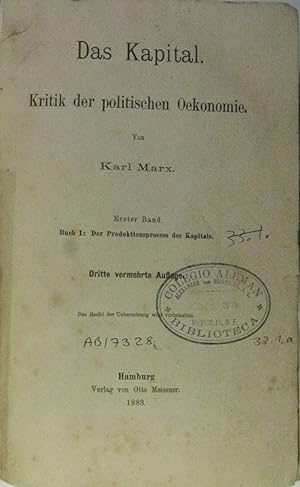
![Bild des Verkäufers für Das Kapital. Kritik der politischen Oekonomie. Dritter Band, zweiter Theil [First edition] zum Verkauf von Antikvariat Valentinska](https://pictures.abebooks.com/inventory/md/md31260427291.jpg)
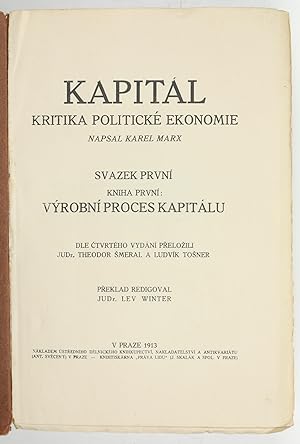

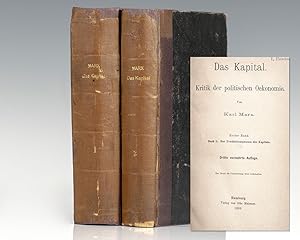
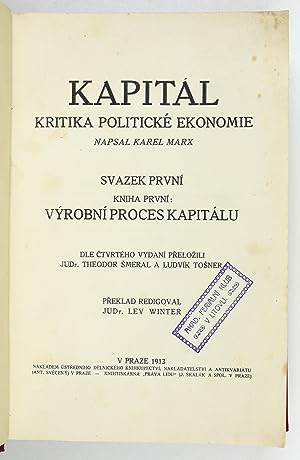
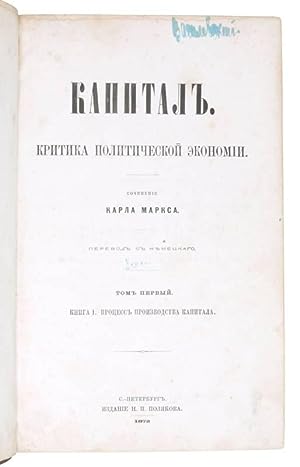
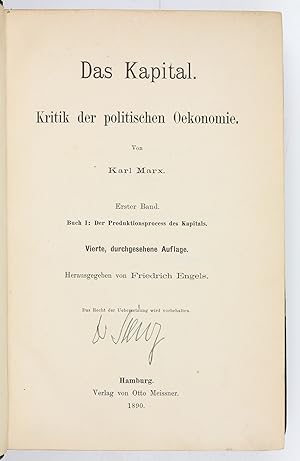
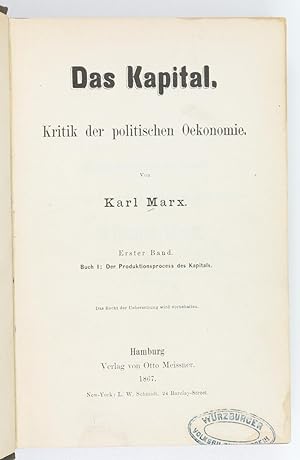

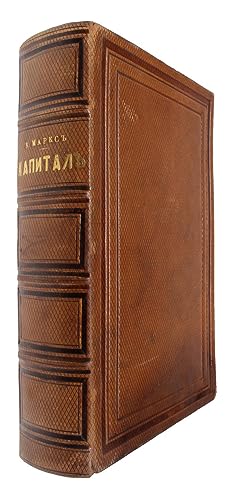



![Bild des Verkäufers für Das Kapital. Kritik der politischen Oekonomie [.] Erster Band. [Author's presentation copy to César de Paepe]. zum Verkauf von Antiquariat INLIBRIS Gilhofer Nfg. GmbH](https://pictures.abebooks.com/inventory/md/md31480352233.jpg)
![Bild des Verkäufers für Kapital. Kritika politicheskoj ekonomii. Perevod c nmetskago. Tom pervoej. Kniga I. Protschess proizvodstva Kapitala. (Russian, = The Capital. Critique of the Political Economy. Translated from German. Volume One. Book I [all].). - [FIRST TRANSLATION INTO ANY LANGUAGE OF "THE BIBLE OF MARXISM"] zum Verkauf von Herman H. J. Lynge & Søn ILAB-ABF](https://pictures.abebooks.com/inventory/md/md31430419122.jpg)
![Bild des Verkäufers für Kapital. Krytyka ekonomii politycznej. Tom Pierwszy. Ksiega I. Wytwarzanie kapitalu. - [FIRST POLISH EDITION OF THE BIBLE OF MARXISM] zum Verkauf von Herman H. J. Lynge & Søn ILAB-ABF](https://pictures.abebooks.com/inventory/md/md31373533415.jpg)
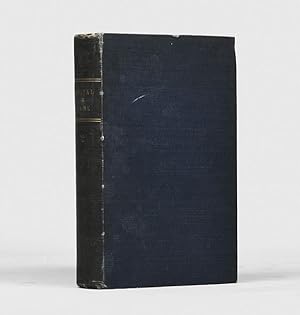
![Bild des Verkäufers für Zur Kritik der politischen Oekonomie. Erstes Heft [all that appeared]. - [THE BLUEPRINT FOR "DAS KAPITAL" - MAGNIFICENT ASSOCIATION-COPY] zum Verkauf von Herman H. J. Lynge & Søn ILAB-ABF](https://pictures.abebooks.com/inventory/md/md30599586392.jpg)
![Bild des Verkäufers für Das Kapital. Kritik der politischen Oekonomie. Zweiter Band. Buch II: Der Cirkulationsprocess des Kapitals. Herausgeben von Friedrich Engels. - ["THE FORGOTTEN BOOK OF CAPITAL"] zum Verkauf von Herman H. J. Lynge & Søn ILAB-ABF](https://pictures.abebooks.com/inventory/md/md30308487366.jpg)
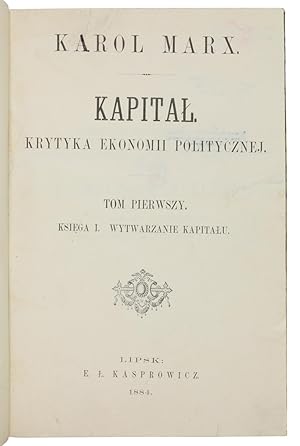
![Bild des Verkäufers für Das Kapital. Kritik der politischen Oekonomie. Erster Band. Buch I: Der Produktionsprocess des Kapitals. - [THE NEW RELIGION - PMM 359] zum Verkauf von Herman H. J. Lynge & Søn ILAB-ABF](https://pictures.abebooks.com/inventory/md/md30166156956.jpg)
![Bild des Verkäufers für Kapitalen. 2 Dele. Første Bind. Kapitalens Produktionsproces. Oversat efter Originalens tredje Oplag. 2. Kapitalens Cirkulationsproces.Udgivet efter Forfatterens Død af Friedrich Engels. [i.e. Danish "Das Kapital"]. - [FIRST DANISH TRANSLATION OF "THE CAPITAL"] zum Verkauf von Herman H. J. Lynge & Søn ILAB-ABF](https://pictures.abebooks.com/inventory/md/md22832888189.jpg)